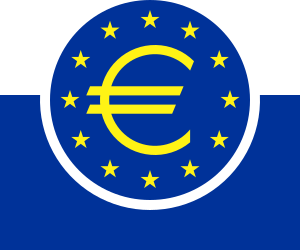| German Logo of the ECB. (Photo credit: Wikipedia) |
But there was no indication of this feeding through to an economy fighting with recession, as lending to the private sector continued to fall. Other data released Thursday were also in line with a number of recent gloomy surveys this week from the euro zone, pointing to continued recession. The ECB said deposits in Spanish, Greek, Irish and Italian banks all rose on the month. That partly reversed earlier outflows caused, among other things, by concerns that the sovereign and bank debt crisis could split the euro zone apart, with fatal consequences for many banks. Private deposits in Italian banks rose 2.1% on the month to a new all-time high.
By contrast, deposits at French and German banks, which had registered substantial safe-haven inflows over recent months, edged down by 0.1% each.
The data offers the latest indication, however tentative, that the ECB's plan for conditional purchases of government bonds, so-called Outright Monetary Transactions, to help keep the euro zone together has started to gain traction in the financial system, even before the program has been deployed.
But the ECB's overall data painted a bleaker picture. Private-sector lending fell 0.8% in September from the same period a year earlier, after dropping 0.6% in August, the ECB said.
Lending to households fell by €1 billion ($1.30 billion) on the month, while lending to companies fell by a dramatic €21 billion.
Marie Diron, an economic adviser to financial-services firm Ernst & Young, said the drop in lending is "consistent with our view that the Eurozone economy is still in a mild recession."
"It suggests that businesses are not seeing as many reasons (as financial markets) to feel more upbeat after the ECB's announcement of its OMT program," Ms. Diron said.
Other data in recent months has suggested that the decline in corporate lending is also a result of changed preferences by companies themselves, which have chosen to issue bonds rather than take new bank loans or refinance old ones. Bank loans account for three-quarters of corporate funding in the euro zone, far more than in the US.
The amount of outstanding bonds issued by euro-zone corporate borrowers has been rising at an annual rate of more than 10% between June and August, according to the ECB. Its figures for September aren't due for a couple of weeks, but September data from Dealogic showed gross new issuance by euro-zone companies at its highest in over 18 months.
The drop in corporate lending meant that the broad M3 monetary aggregate fell for the first time since April, and its annual rate of growth slowed to 2.7% from a downwardly revised 2.8% in August, well below economists' forecasts of 3.1%. Growth in the narrower M1 aggregate, which analysts consider a more accurate reflection of near-term economic activity, also slowed to 5.0% from 5.2%.
The weak lending data appeared to corroborate an overwhelmingly negative appraisal of business confidence in the euro earlier this week, even in core countries such as France and Germany. The Dutch statistics agency CBS added to that Thursday, saying its business confidence index fell to minus 7.7 in October from minus 6.7 in September.
Elsewhere, there was more evidence of an economy treading water at best. Italy, the euro zone's third-largest economy, said retail sales were flat in August, and down 1% on the year.
Italian household consumption is likely to fall 3.3% this year and a further 0.9% in 2013, the retail lobby Confcommercio said Thursday. More than one in every five Italians "can't make it to the end of the month," Confcommercio said.

No comments:
Post a Comment